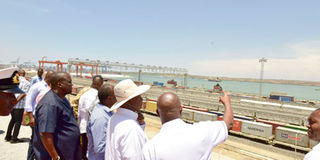Fears over blocking Naivasha dry port

President Museveni accompanied by senior Kenyan and Ugandan government officials tours parts of Mombasa port in March. The dry port, when implemented, will reduce on the cost of transportation of cargo transiting to Uganda. FILE PHOTO
What you need to know:
- According to Kenya Ports Authority (KPA) 2017 annual performance report, the port saw a marginal 1.1 per cent increase in transit goods traffic to 7.75 million tonnes.
Ugandan traders believe that Kenyans blocking the deal brokered between the two member countries to set up a dry port in Naivasha is more than what meets the eye.
Last month, Kenya’s President Uhuru Kenyatta while hosting his counterpart, President Museveni in Mombasa offered land to Uganda to construct a dry port in Naivasha. This development, when implemented, will reduce on the cost of transportation of cargo transiting to Uganda.
This move is part of the joint Standard Gauge Railway (SGR) project push between the two countries.
This pronouncement, however, has been opposed among some Kenyans on the pretext that the land in question belongs to the local people.
In an interview with Prosper Magazine, Mr Everest Kayondo, the chairman -Kampala City Traders Association (Kacita) - an umbrella organisation of mostly traders who import through Kenya, said: “Kenyans blocking Uganda from establishing a dry port in Naivasha is an unfortunate incident because it’s got nothing to do with local cargo but transiting cargo to Uganda.”
He added that the dry port is going to facilitate Ugandan traders, saying blocking this deal is a sign of other underlying issues.
Mr Kayondo says this could be the Kenyan clearing fraternity hiding under the name of locals blocking this deal from happening because they fear to lose jobs to their Ugandan counterparts.
“When the dry port is established in Naivasha, it will mean that Ugandan clearing agents will be the ones doing the job instead of Kenyans,”he said.
The over 78,000-acre disputed land is said to be located on Kedong ranch owned by the Kenyatta family.
Recently, the area Member of Parliament Mr Lemanken Aramat and two Members of the County Assembly (MCAs) were reported in our sister newspaper Business Daily to have warned the government over the plan at a fundraiser in Oloirowua.
Mr Aramat said the community will make sure the phase 2A of SGR does not continue until they get justice.
“We voted in this government. We are in it with the hope that it would assist us but the community has continued to be oppressed mainly on land issues,” said the Jubilee legislator.
“We are expecting the President this week at Kedong, but we are going to tell him to his face that the Maasai community has a lot of stake in this land. Many families are settled there and they must be considered,” said Mr Aramat, adding they should not be deprived of “our birthright.”
“This is a volatile issue. The Maasai have lived in this piece of land since time immemorial and for anyone to ask them to move out is totally unacceptable,” said the Mr Aramat.
“We shall not sit back and watch as our ancestral land is grabbed by the leadership of this country. We ask the President to stop the plan and initiate a dialogue with the community,” said MCA Kipas Lengues.
“Any attempts to take away the land from the Maasai people under the guise of government projects will be resisted,” said Keekonyokie MCA Joseph ole Maloi.
Trade
Uganda is the biggest market for Kenyan goods and the biggest client to Mombasa Port especially for transit cargo, ahead of Democratic Republic of Congo (DRC), South Sudan and Rwanda.
Uganda: Kenya’s largest market
According to Kenya Ports Authority (KPA) 2017 annual performance report, the port saw a marginal 1.1 per cent increase in transit goods traffic to 7.75 million tonnes.
Uganda remained as the largest of the hinterland market accounting for 81.9 per cent of the traffic or 6.34 million tonnes.
The dry port will also see Uganda play a more crucial role for the hinterland countries, including Rwanda and DRC, and also hints at Kenya’s commitment to come through with the last mile of the SGR railways line between Kisumu and Malaba. This will see Uganda secure funding for its Kampala-Malaba line.




